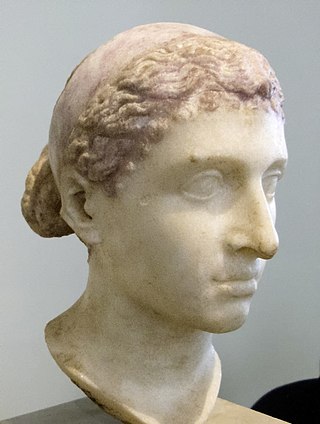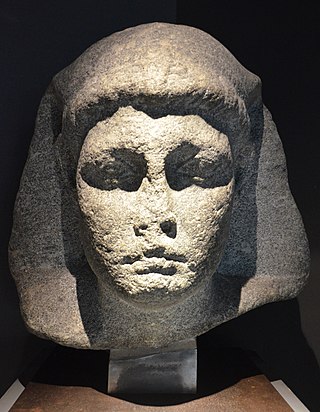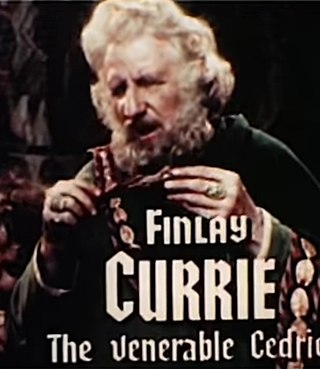Related Research Articles

Marcus Antonius, commonly known in English as Mark Antony, was a Roman politician and general who played a critical role in the transformation of the Roman Republic from a constitutional republic into the autocratic Roman Empire.

This article concerns the period 49 BC – 40 BC.
This article concerns the period 79 BC – 70 BC.

Marcus Licinius Crassus was a Roman general and statesman who played a key role in the transformation of the Roman Republic into the Roman Empire. He is often called "the richest man in Rome".

Cleopatra VII Thea Philopator was Queen of the Ptolemaic Kingdom of Egypt from 51 to 30 BC, and its last active ruler. A member of the Ptolemaic dynasty, she was a descendant of its founder Ptolemy I Soter, a Macedonian Greek general and companion of Alexander the Great. After the death of Cleopatra, Egypt became a province of the Roman Empire, marking the end of the last Hellenistic-period state in the Mediterranean and of the age that had lasted since the reign of Alexander. Her first language was Koine Greek and she is the only known Ptolemaic ruler to learn the Egyptian language.

Ptolemy XV Caesar, nicknamed Caesarion, was the last pharaoh of Ptolemaic Egypt, reigning with his mother Cleopatra VII from 2 September 44 BC until her death by 12 August 30 BC, then as sole ruler until his death was ordered by Octavian.

Sword-and-sandal, also known as peplum, is a subgenre of largely Italian-made historical, mythological, or biblical epics mostly set in the Greco-Roman antiquity or the Middle Ages. These films attempted to emulate the big-budget Hollywood historical epics of the time, such as Samson and Delilah (1949), Quo Vadis (1951), The Robe (1953), The Ten Commandments (1956), Ben-Hur (1959), Spartacus (1960), and Cleopatra (1963). These films dominated the Italian film industry from 1958 to 1965, eventually being replaced in 1965 by spaghetti Western and Eurospy films.

The Donations of Alexandria was a political act by Cleopatra VII and Mark Antony in which they distributed lands held by Rome and Parthia among Cleopatra's children and gave them many titles, especially for Caesarion, the son of Julius Caesar. This was the second of two such donations; a similar donation ceremony had taken place two years earlier at Antioch in 36 BC, at which time the donations enjoyed Octavian's full approval of the Antonine strategy of dominating the East by exploiting Cleopatra's unique royal Seleucid lineage in the donated territories. Ultimately, the Donations caused a fatal rupture in Antonine relations with Rome and were one of the causes of the final war of the Roman Republic.

This is a chronology of warfare between the Romans and various Germanic peoples. The nature of these wars varied through time between Roman conquest, Germanic uprisings, later Germanic invasions of the Western Roman Empire that started in the late second century BC, and more. The series of conflicts was one factor which led to the ultimate downfall of the Western Roman Empire in particular and ancient Rome in general in 476.
The Dacian Wars were two military campaigns fought between the Roman Empire and Dacia during Emperor Trajan's rule. The conflicts were triggered by the constant Dacian threat on the Danubian province of Moesia and also by the increasing need for resources of the economy of the Empire.
Pothinus or Potheinos, a eunuch, was regent for Pharaoh Ptolemy XIII Theos Philopator of the Ptolemaic Kingdom. He is most remembered for turning Ptolemy against his sister and co-ruler Cleopatra, thus starting a civil war, and for having Pompey decapitated and presenting the severed head to Julius Caesar according to some sources.

William Finlay Currie was a Scottish actor of stage, screen, and television. He received great acclaim for his roles as Abel Magwitch in the British film Great Expectations (1946) and as Balthazar in the American film Ben-Hur (1959).

The War of Actium was the last civil war of the Roman Republic, fought between Mark Antony and Octavian. In 32 BC, Octavian convinced the Roman Senate to declare war on the Egyptian queen Cleopatra. Her lover and ally Mark Antony, who was Octavian's rival, gave his support for her cause. Forty percent of the Roman Senate, together with both consuls, left Rome to join the war on Antony's side. After a decisive victory for Octavian at the Battle of Actium, Cleopatra and Antony withdrew to Alexandria, where Octavian besieged the city until both Antony and Cleopatra were forced to commit suicide.

Gaius Julius Caesar, one of the most influential men in world history, has frequently appeared in literary and artistic works since ancient times.

Ettore Manni was an Italian film actor. He appeared in more than 100 films between 1952 and 1979.
The Gabiniani were 2000 Roman legionaries and 500 cavalrymen stationed in Egypt by the Roman general Aulus Gabinius after he had reinstated the Pharaoh Ptolemy XII Auletes on the Egyptian throne in 55 BC. The soldiers were left to protect the King, but they soon adopted the manners of their new country and became completely alienated from the Roman Republic. After the death of Auletes in 51 BC, they helped his son Ptolemy XIII in his power struggle against his sister Cleopatra and even involved Julius Caesar, the supporter of Cleopatra, during Caesar's Civil War up to the siege of Alexandria in violent battles.

The military campaigns of Julius Caesar constituted both the Gallic Wars and Caesar's civil war. The Gallic War mainly took place in what is now France. In 55 and 54 BC, he invaded Britain, although he made little headway. The Gallic War ended with complete Roman victory at the Battle of Alesia. This was followed by the civil war, during which time Caesar chased his rivals to Greece, decisively defeating them there. He then went to Egypt, where he defeated the Egyptian pharaoh and put Cleopatra on the throne. He then finished off his Roman opponents in Africa and Hispania. Once his campaigns were over, he served as Roman dictator until his assassination on 15 March 44 BC. These wars were critically important in the transition of the Roman Republic into the Roman Empire.